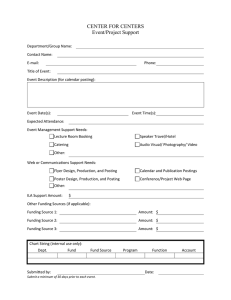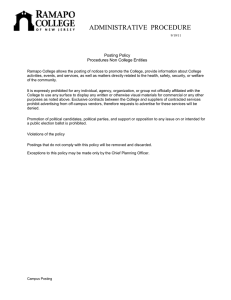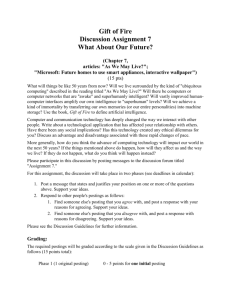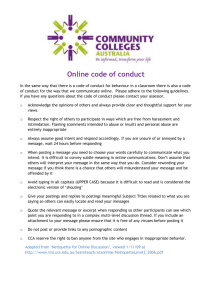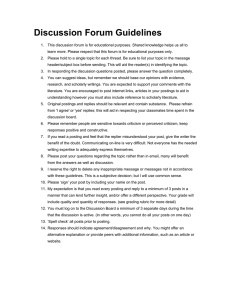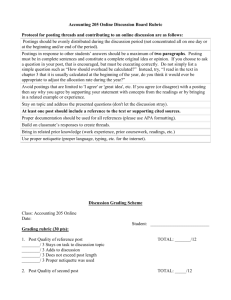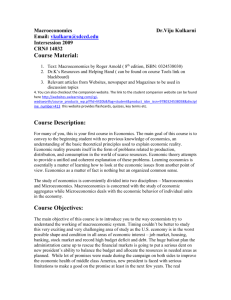Peoples and Cultures of Southeast Asia
advertisement
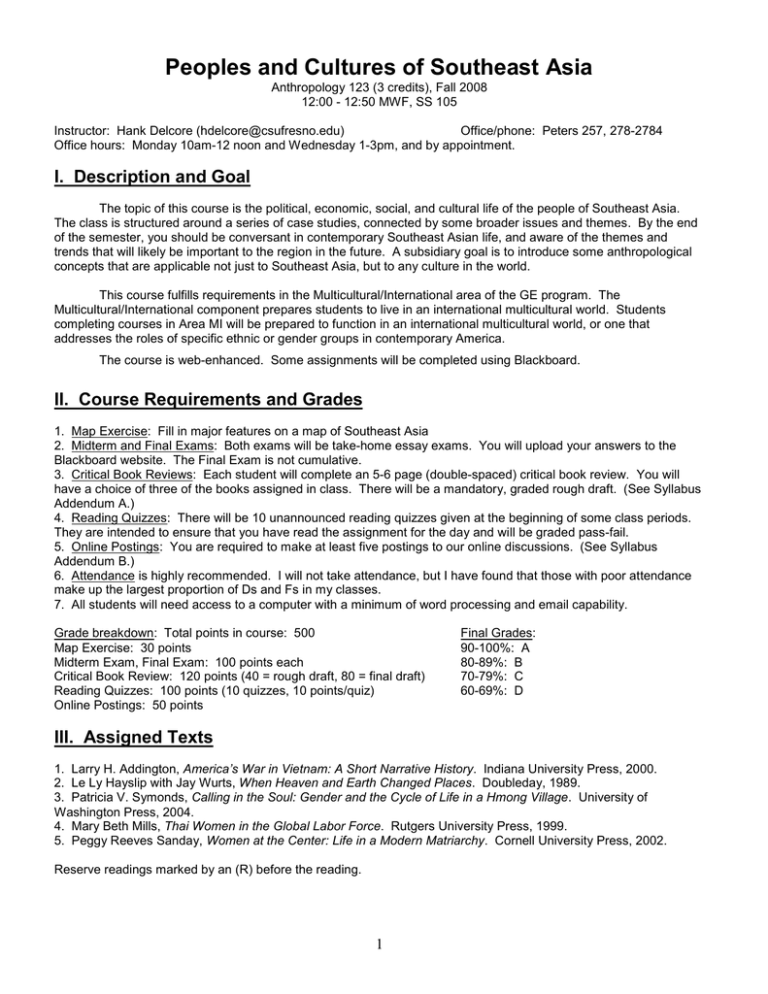
Peoples and Cultures of Southeast Asia Anthropology 123 (3 credits), Fall 2008 12:00 - 12:50 MWF, SS 105 Instructor: Hank Delcore (hdelcore@csufresno.edu) Office/phone: Peters 257, 278-2784 Office hours: Monday 10am-12 noon and Wednesday 1-3pm, and by appointment. I. Description and Goal The topic of this course is the political, economic, social, and cultural life of the people of Southeast Asia. The class is structured around a series of case studies, connected by some broader issues and themes. By the end of the semester, you should be conversant in contemporary Southeast Asian life, and aware of the themes and trends that will likely be important to the region in the future. A subsidiary goal is to introduce some anthropological concepts that are applicable not just to Southeast Asia, but to any culture in the world. This course fulfills requirements in the Multicultural/International area of the GE program. The Multicultural/International component prepares students to live in an international multicultural world. Students completing courses in Area MI will be prepared to function in an international multicultural world, or one that addresses the roles of specific ethnic or gender groups in contemporary America. The course is web-enhanced. Some assignments will be completed using Blackboard. II. Course Requirements and Grades 1. Map Exercise: Fill in major features on a map of Southeast Asia 2. Midterm and Final Exams: Both exams will be take-home essay exams. You will upload your answers to the Blackboard website. The Final Exam is not cumulative. 3. Critical Book Reviews: Each student will complete an 5-6 page (double-spaced) critical book review. You will have a choice of three of the books assigned in class. There will be a mandatory, graded rough draft. (See Syllabus Addendum A.) 4. Reading Quizzes: There will be 10 unannounced reading quizzes given at the beginning of some class periods. They are intended to ensure that you have read the assignment for the day and will be graded pass-fail. 5. Online Postings: You are required to make at least five postings to our online discussions. (See Syllabus Addendum B.) 6. Attendance is highly recommended. I will not take attendance, but I have found that those with poor attendance make up the largest proportion of Ds and Fs in my classes. 7. All students will need access to a computer with a minimum of word processing and email capability. Grade breakdown: Total points in course: 500 Map Exercise: 30 points Midterm Exam, Final Exam: 100 points each Critical Book Review: 120 points (40 = rough draft, 80 = final draft) Reading Quizzes: 100 points (10 quizzes, 10 points/quiz) Online Postings: 50 points Final Grades: 90-100%: A 80-89%: B 70-79%: C 60-69%: D III. Assigned Texts 1. Larry H. Addington, America’s War in Vietnam: A Short Narrative History. Indiana University Press, 2000. 2. Le Ly Hayslip with Jay Wurts, When Heaven and Earth Changed Places. Doubleday, 1989. 3. Patricia V. Symonds, Calling in the Soul: Gender and the Cycle of Life in a Hmong Village. University of Washington Press, 2004. 4. Mary Beth Mills, Thai Women in the Global Labor Force. Rutgers University Press, 1999. 5. Peggy Reeves Sanday, Women at the Center: Life in a Modern Matriarchy. Cornell University Press, 2002. Reserve readings marked by an (R) before the reading. 1 IV. Assignment and Examination Schedule Note: Not all due dates will apply to you ! You choose only one of the three books (Symonds, Mills, Sanday) to review, so you can ignore the dates that don’t apply to you. I suggest that once you choose, you line out the due dates for the books you are not reviewing. Date Sep. 4 Sep. 15 Oct. 3 Oct. 17 Oct. 24 Oct. 31 Nov. 12 Nov. 14 Nov. 21 Dec. 3 Dec. 8 Dec. 12 Dec. 17 Dec. 17 Ongoing throughout semester Assignment Map Exercise due First posting deadline Second posting deadline Midterm Exam due Third posting deadline Symonds Review Draft Due Symonds Review Due Fourth posting deadline Mills Review Draft Due Mills Review Due Fifth posting deadline Sanday Review Draft Due Final Exam due Sanday Review Due Reading quizzes 2 Points 30 10 10 100 10 40 80 10 40 80 10 40 100 80 100 Total: 500 V. Other Information • Show respect for those around you. Avoid these things that distract me and your classmates: o It is distracting to others when you come in late or leave early. If you know in advance that you must leave early, tell me before class and sit near a door. If you have to leave for an emergency, then do so. o It is distracting to others when you answer the phone or text message in class. Don’t. o It is distracting to others when you eat in class. Drinking is okay. • There will be no extended deadlines for assignments, except in extreme cases (serious illness, death of immediate family member, etc.). You must contact me before the test/due date to discuss your situation. Late assignments will drop one full letter grade for every week late (starting the day the assignment is due). • If you are absent from class, it is your responsibility to check on announcements made while you were away. • This syllabus is a tentative schedule and set of requirements. I will inform you of any changes. Further: 1. Students with disabilities: The Department of Anthropology cooperates with the Services for Students with Disabilities (278-2811) to make reasonable accomodations for qualified students (cf. Americans with Disabilities Act and Section of 504, Rehabilitation Act). Please identify yourself to me, and present a written request for accomodation as soon as possible. 2. Cheating and plagiarism: Cheating is the actual or attempted practice of fraudulent or deceptive acts for the purpose of improving one's grade or obtaining course credit; such acts also include assisting another student to do so. Typically, such acts occur in relation to examinations. However, it is the intent of this definition that the term “cheating” not be limited to examination situations only, but that it include any and all actions by a student that are intended to gain an unearned academic advantage by fraudulent or deceptive means. Plagiarism is a specific form of cheating which consists of the misuse of the published and/or unpublished works of others by misrepresenting the material as one's own work. In written work, any ideas that are not your own must be cited as to source. Any wording that is the same as that used in the source material must be enclosed by quotes and cited. The responsibility to cite all sources used includes both printed and Internet materials. Penalties for cheating and plagiarism range from a 0 or F on a particular assignment, through an F for the course, to expulsion from the university. For more information on the University’s policy regarding cheating and plagiarism, refer to the Schedule of Courses (Legal Notices on Cheating and Plagiarism) or the University Catalog. 3. It is okay to tape record lectures for personal use, but as a courtesy, let me know beforehand. 4. Class room etiquette: The class room is a place marked by free and open exchange of ideas and opinions, together with respect among everyone present. In the course of lecture and discussion, some controversial ideas and opinions may be presented. This is a normal and healthy part of a university education, provided we all maintain respect for those around us. Failure to follow this simple rule could result removal from class. Some more specific requirements for class room etiquette are: (a) No talking while anyone else is talking. I will moderate discussions and identify the speaker. (b) No behavior or speech that creates a threatening or disrespectful atmosphere will be tolerated. No personal attacks or insults against anyone in the class. 3 Semester Schedule Week 1 August 25: Course Introduction / Discussion of Assignments Class exercise: “What do you know about Southeast Asia ?” Orientation to the map of Southeast Asia August 27: Introduction to the Vietnam War Class exercise: “What do you know about the Vietnam War ?” August 29: Introduction to the Vietnam War: What Was It??? Addington, Chapters 1-2 Hand out Map Exercise Week 2 September 1: Labor Day – no classes September 3: Roots of the American War Film: “Roots of a War (1945-1953)” Addington, Chapters 3-4 September 5: Roots of the American War Hayslip, Prologue, Chapters 1 and 2 (R) Chanoff and Toai, pp. 3-11 (Xuan Vu) Map Exercise due in class Week 3 September 8: The Diem Years Film: Portions of “America’s Mandarin (1954-1963)” Addington, Chapters 5-7 (R) Chanoff and Toai, pp. 11-21 (Nguyen Cong Hoan), 42-43 (Nguyen Tan Thanh), 43-45 (Phan Thanh Long), and 49-55 (Hoang Thien Loc), 134-146 (Venerable Giac Duc) September 10: US Entrance Into the War / The Other Side Hayslip, Chapter 3 (R) Chanoff and Toai, pp. 55-67 (Le Thanh) September 12: Film / The Other Side Film: Portions of “Tet 1968” and “Vietnamizing the War” Addington, Chapters 8-10 4 Week 4 September 15: Film / Impact on Vietnam Film: Portions of “Vietnamizing the War” Addington, Chapter 11 Hayslip, Chapters 4 and 5 (R) Chanoff and Toai, pp. 161-164 (Nguyen Van Mo), 152-158 (Huong Van Ba), 94-113 (Trinh Duc), 125-126 (Nguyen Van Mo), 127-129 (Tran Van Truong/Richard Stratton), 130-134 (Van Anh) First posting deadline September 17: Film “Homefront USA” Hayslip, Chapter 6 September 19: Film “Cambodia and Laos” Hayslip, Chapter 7 Week 5 September 22: Cambodia and Laos September 24: Film Selections from “Hmong Voices” Hayslip, Chapters 8 and 9 September 26: The End of the American War Addington, Chapters 12-14 (R) Chanoff and Toai, 177-187 (Xuan Vu) Week 6 September 29: Heaven and Earth Hayslip, Chapters 10-12 October 1: Film “Bombies” October 3: No class – instructor at conference Second posting deadline Week 7 October 6: Heaven and Earth Slides from Vietnam and Cambodia Hayslip, Chapters 13 and 14 Midterm exam handed out October 8: Vietnam War -- Conclusion October 10: Background to Calling in the Soul Symonds, Preface and Introduction 5 Week 8 October 13: Calling in the Soul Symonds, Chapter 1 October 15: Film TBA October 17: Calling in the Soul Symonds, Chapters 2 and 3 Midterm exam due online (by midnight) Week 9 October 20: Calling in the Soul Symonds, Chapter 4 October 22: No class – participate in online discussion October 24: Calling in the Soul Symonds, Chapter 5, Epilogue, and Appendices E and F Third posting deadline Week 10 October 27: Background to Thai Women October 29: Background to Thai Women Mills, Chapter 1 October 31: Film “King, Combat and Ad Carabao” Symonds Review Draft due online (by midnight) Week 11 November 3: Thai Women in the Global Labor Force Mills, Chapters 2 and 3 November 5: No class – participate in online discussion November 7: Thai Women in the Global Labor Force Mills, Chapters 4 and 5 Week 12 November 10: Thai Women in the Global Labor Force Mills, Chapters 6 and 7 November 12: Film Film: “Bangkok Zigzag” Symonds Review due online (by midnight) November 14: Thai Women in the Global Labor Force Mills, Chapters 8 and 9 Fourth posting deadline 6 Week 13 November 17: Background to Women at the Center Sanday, Preface and Introduction November 19: No class – instructor at conference November 21: No class – instructor at conference Mills Review Draft due online (by midnight) Week 14 November 24: Women at the Center Sanday, Chapters 1-4 November 26 and 28: Thanksgiving Break Week 15 December 1: Women at the Center Sanday, Chapter 5-7 December 3: No class – participate in online discussion Mills Review due online (by midnight) December 5: Women at the Center Sanday, Chapter 8-10 Week 16 December 8: Conclusion Sanday, Chapters 11-14 Final exam handed out Fifth posting deadline December 10: Open December 12 is during Dead Days. It is not a class day, but on that day: Sanday Review Draft due online (by midnight) Finals week: Wed., Dec. 17, 1:15-3:15pm Final exam due online (by midnight) Sanday Review due online (by midnight) 7 Syllabus Addendum A: Critical Book Review Guide During the course you will write a critical review for one of the books assigned in class. The job is not to write a summary or a book report. A report just tells what’s in a book. A critical review conveys something more interesting, namely: your informed judgment about the author’s success at proving their argument. In judging a review, I’m looking for your answers to the following: 1. What’s the book’s big issue ? What point or argument is the author trying to make ? Some authors come right out and state the argument or main point up front. Others are less explicit. If the author does not make a clear statement about the goal of the book, then you should consider the book as a whole, keeping an eye out for recurring themes. Pay attention to topics, concepts and terms that come up repeatedly. When an author returns to a single idea over and over, then you can bet it is important. 2. How does the author address the main point ? Once you have an idea about the major goal or argument of the book, you should ask yourself: How does the author make the argument or reach the goal ? The key question here is: What sort of data does the author use to support the point ? You need to display a detailed understanding of the author’s argument. It is not enough to simply tell me what the author argued. You also have to tell me how they proved (or failed to prove !) that argument, how they reached (or failed to reach !) their goal. What information did the author present, and was the information satisfactory ? If not, what were the shortcomings ? 3. What assumptions underlie the author’s thinking ? Are there any hidden assumptions or biases that influenced the author’s argument ? Most authors in the social sciences must overcome obstacles in their efforts to accurately portray the people they study. Did you feel the author succeeded in providing an accurate account ? Why or why not ? Do you see any evidence that the author’s argument was influenced by some preconceived idea ? Did the author’s own social position or cultural background influence their work ? Is there something you know about the major issue (perhaps an alternative argument) that reveals an element of bias in author’s the argument ? 4. Did the book change your way of seeing the topic ? Here, I am inviting you to relate the book to your own personal views and experiences -- to give me a glimpse of our own values and style, and if appropriate, a touch of your own experience or humor. Before you read the book under review, did you have any ideas or knowledge about the subject ? If so, did the book conform to what you thought you knew, or did it change your mind about something ? If you didn’t know much about the people or subjects covered in the books, then tell me what impression the book left you with. Were you surprised, pleased, angered, saddened, etc. by the book ? At each point, explain how and why you think and feel the way you do. Further notes: A critical book review is a bit like “an argument within an argument.” In other words, you need to argue to me that you know the author’s main point, and then go on and explain what that point is and how the author handles it. A good review doesn’t rehash what’s in the book. It can include a telling quote or two (always with page references). But it should also give me a glimpse of our own values and style, and if appropriate, a touch of your own experience or humor. 8 At the same time, every point you make should be backed up with evidence. For example, suppose that you say in your paper that the author made good use of specific examples to provide evidence for their larger argument. You then need to cite some specific places in the book where the author presented good examples and how they related to the main argument of the book. In a critical book review, unfounded statements are worthless. Your work will be graded on both the content of the paper and your ability to structure a clear, well-written argument (introduction-body-conclusion, coherent paragraphs, proper grammar, correct spelling). Each review should be 5-6 double-spaced pages, 12 point type, one inch margins. 9 Syllabus Addendum B: Guide to Online Postings Introduction During the semester, there will be opportunities to participate in online discussions connected to course material. These discussions will occur in the “Communication” area of the Blackboard website, under “Discussion Board.” All students will make at least five quality contributions to online discussions during the course of the semester. Each of your five postings is worth 10 points. I will grade the postings using the criteria discussed later in this handout. Due dates for postings are on the syllabus. All deadlines are by midnight. If you make more than the minimum number of postings in a specified period, I will identify your best postings during that period and grade those. So, there are no penalties for making more than the required number of postings. Warning: Postings made on the last few days (that is, right before the deadline) will be very toughly graded. You will do best at this assignment if you visit the site regularly (several times a week) and check in on whatever discussions are occurring. This way, you can you’re your postings at a time when you spot a discussion to which you can contribute something meaningful. Topics for the Postings Posting 1: Open to any topic covered thus far in the semester. Posting 2: Please reflect on the videos, “Hmong Voices.” Consider posting comments on the following questions: • Were you surprised by anything you learned from the videos? • Were the videos consistent with anything you already knew about the Hmong involvement in the “Secret War”? • Does anyone you know have an experience that compares or contrasts with those of the “Hmong Voices” speakers? • Did “Hmong Voices” result in any changes in the way you see the Vietnam War? Did it result in any changes in the way you see the Hmong or their role in the war? Posting 3: Please reflect on the ways Hmong culture, as described in Symonds, “Calling in the Soul,” compares or contrasts with Hmong culture as you have observed it here in the US. Consider posting comments on the following questions: • What did you know about Hmong culture before reading the book? Has the book altered your view point at all? • If you come from a Hmong family, how do the people of Flower Village compare or contrast with the ways of your family and other Hmong people you know in the US? • How do you think Hmong culture has changed as a result of living in the US? Posting 4: Open to any topic covered thus far in the semester. Posting 5: Open to any topic covered thus far in the semester. What Do I Mean by “Quality”? What do I mean by “quality contributions” to online discussion ? First, let me explain what I DO NOT mean. • • One word postings (“Yes,” “No,” “Why ?”, etc.) will not count toward your grade. You are free to make such postings (they are often needed in a discussion), but I will not grade them. Brief, unsupported statements of opinion also do not count. If a classmate posts a statement and you post back, “I disagree with that,” then you have not contributed to the discussion in a substantive way. On the 10 other hand, if you state, “I disagree with that,” and then follow it with an explanation of how and why you disagree, then that kind of posting will count toward fulfilling this requirement. Here are examples of what I do mean by quality postings: • • A statement of some piece of information (from course materials or elsewhere) that helps shed light on the topic under discussion. Always explain where you have gotten your information. Your own original ideas and opinions supported by information from lecture or readings, material from other classes, information or ideas you have picked up somewhere else (again, explain your source), or personal experiences, if relevant. I stress that your statements of opinion must be supported by something. We are certainly all entitled to our opinions, but it is also true that not all opinions are created equal. Some opinions are quickly and easily disproved. For example, the statement, “In my opinion, the Holocaust never happened” is easy to disprove. Other opinions are much more complicated. For example, the statement, “I think humans as a species are inherently violent” is much more open for debate. This is a very complicated claim to make, and talking it over could draw in all kinds of complex information and theories. So, if you choose to state your opinion online, remember to contribute not just your opinion, but your opinion supported by an argument, including facts, arranged in logical order, etc. Finally: • Use proper punctuation, grammar, spelling, etc. I do not expect your postings to be literary masterpieces, but they should meet minimal standards of English usage. For example, no postings in all lower-case letters with no punctuation. Online Etiquette I will moderate all online discussions and enforce appropriate rules of behavior. Remember, as the instructor, I am able to remove any postings that are not relevant to the course, or that conflict with the course’s goals or rules of etiquette. Serious violations of online etiquette can bring the following actions: suspension of posting privileges (and whatever loss of points that might involve), loss of entire 80 points for online postings, a failing grade for the class, administrative drop from the class. The most basic point about online etiquette is this: • Respect. The discussion area of the Blackboard site is an extension of the regular class room where we meet face-to-face. The basic rules of the class room therefore apply to the discussion board, as well. The course syllabus states: “The class room is a place marked by free and open exchange of ideas and opinions, together with respect among everyone present. In the course of lecture and discussion, some controversial ideas and opinions may be presented. This is a normal and healthy part of a university education, provided we all maintain respect for those around us. Failure to follow this guidelines will result is discipline or removal from class.” The syllabus goes on to say: “No behavior or speech that creates a threatening or disrespectful atmosphere will be tolerated. No personal attacks or insults against anyone in the class.” The key point is to respect others. You can think of it in terms of the “golden rule”: Treat others as you would want to be treated. There are some additional points that apply specifically to web-based communication: • • Remember, typed words on a computer screen do not always express the emotions that you want to express. Your online postings do not convey facial expressions, hand gestures, tone of voice, or any of the other forms of communication we are accustomed to in face-to-face interaction. This can create all kinds of misunderstandings. Sarcastic remarks online, for example, can be easily misinterpreted because sarcasm relies on tone of voice to convey the fact that the speaker actually means the opposite of what they are saying. Another more subtle problem is this: Face-to-face, we often “soften” direct statements with tone of voice or facial expressions (such as a doubtful look). Without these devices, statements online can seem too direct, too critical, or even insulting. Read your postings carefully before actually posting them, and ask yourself: “If a stranger read this, what impression would I get ?” Then, if necessary, adjust the language or explain your intent very clearly. Be concise and to the point. Focus on one subject (the subject currently under discussion) per message. 11 • • • Be forgiving of others’ mistakes. You may read someone else’s posting and find it riddled with errors of form and content. On errors of form – leave that to me to correct. If you see errors of content (the message says something you disagree with), then offer a counter-argument – but do it politely ! If the message contains what you consider to be a blatant mistake, your first reaction might be, “That’s stupid.” This is the point where you should pause and carefully consider your response. A correction may be needed, and you may be the one who can make the correction, but do it gently. We do not all share the same bodies of knowledge. If we did, we could pack up the university and go home. What you think is “common knowledge” might be news to someone else. No “flaming.” A “flame” is an antagonistic message that is meant to shock or offend. I hope that you will make strong arguments and counter-arguments, and let the rest of us know when you feel strongly about something, but remember – respect. Suppose someone makes a posting that you think is all wrong. A “flame” response from you might read, “Only an idiot would say that.” A real, constructive response might begin, “I disagree strongly with what you’ve said and I think there is a lot of evidence that it is not correct…” – followed of course by the evidence. There are various ways to add emphasis to an online posting. For example, you can enclose the term of emphasis with *asterisks*. You can also use emoticons, like , to indicate good will, a joking attitude, etc. One method I want to discourage is the use of capitalization. CAPITALIZING SOME STATEMENT TO PROVIDE EMPHASIS is the online equivalent of yelling in someone’s face; don’t do it. Exclamation points should also be used sparingly. 12
